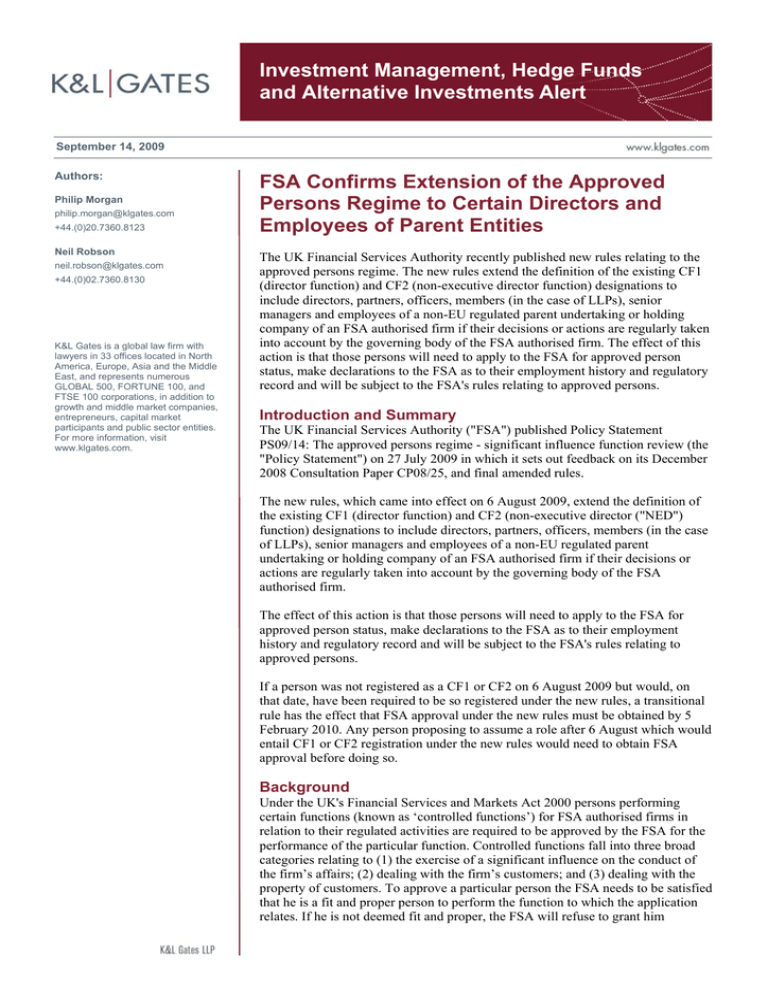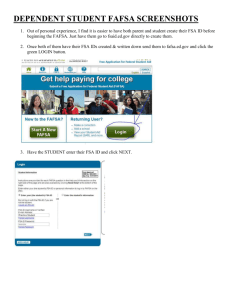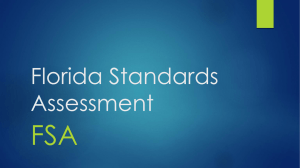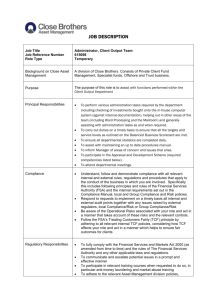
Investment Management, Hedge Funds
and Alternative Investments Alert
September 14, 2009
Authors:
Philip Morgan
philip.morgan@klgates.com
+44.(0)20.7360.8123
Neil Robson
neil.robson@klgates.com
+44.(0)02.7360.8130
K&L Gates is a global law firm with
lawyers in 33 offices located in North
America, Europe, Asia and the Middle
East, and represents numerous
GLOBAL 500, FORTUNE 100, and
FTSE 100 corporations, in addition to
growth and middle market companies,
entrepreneurs, capital market
participants and public sector entities.
For more information, visit
www.klgates.com.
FSA Confirms Extension of the Approved
Persons Regime to Certain Directors and
Employees of Parent Entities
The UK Financial Services Authority recently published new rules relating to the
approved persons regime. The new rules extend the definition of the existing CF1
(director function) and CF2 (non-executive director function) designations to
include directors, partners, officers, members (in the case of LLPs), senior
managers and employees of a non-EU regulated parent undertaking or holding
company of an FSA authorised firm if their decisions or actions are regularly taken
into account by the governing body of the FSA authorised firm. The effect of this
action is that those persons will need to apply to the FSA for approved person
status, make declarations to the FSA as to their employment history and regulatory
record and will be subject to the FSA's rules relating to approved persons.
Introduction and Summary
The UK Financial Services Authority ("FSA") published Policy Statement
PS09/14: The approved persons regime - significant influence function review (the
"Policy Statement") on 27 July 2009 in which it sets out feedback on its December
2008 Consultation Paper CP08/25, and final amended rules.
The new rules, which came into effect on 6 August 2009, extend the definition of
the existing CF1 (director function) and CF2 (non-executive director ("NED")
function) designations to include directors, partners, officers, members (in the case
of LLPs), senior managers and employees of a non-EU regulated parent
undertaking or holding company of an FSA authorised firm if their decisions or
actions are regularly taken into account by the governing body of the FSA
authorised firm.
The effect of this action is that those persons will need to apply to the FSA for
approved person status, make declarations to the FSA as to their employment
history and regulatory record and will be subject to the FSA's rules relating to
approved persons.
If a person was not registered as a CF1 or CF2 on 6 August 2009 but would, on
that date, have been required to be so registered under the new rules, a transitional
rule has the effect that FSA approval under the new rules must be obtained by 5
February 2010. Any person proposing to assume a role after 6 August which would
entail CF1 or CF2 registration under the new rules would need to obtain FSA
approval before doing so.
Background
Under the UK's Financial Services and Markets Act 2000 persons performing
certain functions (known as ‘controlled functions’) for FSA authorised firms in
relation to their regulated activities are required to be approved by the FSA for the
performance of the particular function. Controlled functions fall into three broad
categories relating to (1) the exercise of a significant influence on the conduct of
the firm’s affairs; (2) dealing with the firm’s customers; and (3) dealing with the
property of customers. To approve a particular person the FSA needs to be satisfied
that he is a fit and proper person to perform the function to which the application
relates. If he is not deemed fit and proper, the FSA will refuse to grant him
Investment Management, Hedge Funds and Alternative
Investments Alert
approval. As a result of being an approved
person, an individual is, amongst other things,
subject to the FSA’s Statements of Principle and
Code of Practice for Approved Persons.
An applicant for approved person status has to
make a declaration to the FSA of their
employment history for the last five years, the
circumstances of any departures from previous
employments, and of any regulatory and/or
criminal breaches, licence refusals etc. For some
individuals such disclosures may be sensitive
because of concerns about confidentiality of
information or because of unfavourable
information that would need to be disclosed to
the FSA.
for that UK firm (that is, functioning as the
audit committee for the group);
•
a director (other than a non-executive
director) of a parent undertaking or holding
company of a UK firm exercising significant
influence by way of his involvement in
taking decisions for that UK firm;
•
an individual (such as a senior manager) of a
parent undertaking or holding company of a
UK firm who is responsible for and/or has
significant influence in setting the objectives
for and the remuneration of executive
directors of that UK firm;
•
an individual who is a director (other than a
non-executive director) or a senior manager
of a parent undertaking or holding company
of a UK firm who is accustomed to
influencing the operations of that UK firm,
and acts in a manner in which it can
reasonably be expected that an executive
director or senior manager of that UK firm
would act;
•
an individual of an overseas firm which
maintains an establishment in the United
Kingdom from which regulated activities are
carried on where that individual has
responsibilities for those regulated activities
which are likely to enable him to exercise
significant influence over the UK branch.
Changes
The principal changes made by the FSA in the
Policy Statement are as follows:
1. Directors and non-executive directors
1.1 The scope and application of the CF1 (the
director function) and CF2 (the NED function)
designations have been extended to include
directors, partners, officers, members (in the case
of LLPs), senior managers and employees of an
unregulated parent undertaking or holding
company whose decisions or actions are regularly
taken into account by the governing body of the
relevant FSA authorised firm, provided that there
is an arrangement with the authorised firm in
place relating to the relevant role. 'Unregulated' in
this context means unregulated by the FSA or any
other European Union financial services
regulator. Before the extension, the CF1 and CF2
designations under the approved persons regime
were relevant only to directors of an FSA
authorised firm and persons in accordance with
whose directions or instructions (not being advice
given in a professional capacity) those directors
were accustomed to act. One point to note
regarding the new CF1/ CF2 rules is that they do
not extend to shareholders in parent companies.
1.2 The new text of the FSA's Supervision
Manual gives several examples of when the FSA
is likely to require CF1 registration. Firms should
consider whether they have any individuals in
these positions and whether they need to obtain
CF1 approved persons status for them:
•
a chairman of an audit committee of a parent
undertaking or holding company of a UK
firm where that audit committee is working
1.3 Application to FSA-authorised firms that
are limited liability partnerships
The extended CF1 requirements are expressly
stated in the new rules to apply to all FSA
authorised firms that are bodies corporate other
than LLPs. The equivalent provision in relation
to LLPs remains that the relevant designation,
CF4, extends only to members of the LLP and
persons in accordance with whose directions or
instructions (not being advice given in a
professional capacity) the members are
accustomed to act. This would not extend to the
directors of a company which is a controlling
member of the LLP by virtue only of their being
directors of that company.
The extended CF2 requirements, by contrast, do
apply to FSA authorised firms that are LLPs.
Thus, a NED of an unregulated parent
undertaking or holding company of such a firm
whose decisions or actions are regularly taken
into account by the governing body of the firm
would need to become a CF2 FSA approved
person.
September 14, 2009
2
Investment Management, Hedge Funds and Alternative
Investments Alert
2. Proprietary Traders
The definition of controlled function CF29 (the
significant management function) has been
extended to include all proprietary traders who
are not senior managers but who are considered
likely to exert significant influence on the
relevant FSA authorised firm.
3. Branches
The approved persons regime has been extended
so that all controlled functions will apply to
relevant persons working in UK-based branches
of non-EEA overseas firms (subject to certain
differences in relation to the application of the
significant management function (CF29)).
4. References
Where requested, firms are now required by FSA
rules to provide employment references for
applicants to all controlled functions (formerly
this applied to applicants for the customer
functions only).
Rationale
The FSA states in PS09/14 that in its view the
benefits of the extended approved persons regime
include the ability to hold individuals accountable
for the carrying on of their responsibilities and
that this should assist prudent and sensible
management within FSA authorised firms.
closely where it believes they should have
intervened more actively within a firm’s
management. Before making a final decision on
this issue, the FSA wishes to consider the
relevant recommendations of Sir David Walker's
review of corporate governance in UK banks and
other financial institutions and the Financial
Reporting Council’s review of the Combined
Code on Corporate Governance which should be
available in the third or fourth quarter of 2009.
Timing
The rule changes in the Policy Statement came
into effect on 6 August 2009. Transitional
arrangements apply in relation to any person who
would, on 6 August 2009, have been required to
be approved under the new rules. Such persons
need to apply for and receive FSA approval
under the new rules by 5 February 2010. Any
person proposing to assume a role after 6 August
which would entail registration under the new
rules will need to obtain FSA approval before
doing so. Firms should accordingly be reviewing
relevant arrangements in place on 6 August 2009
with a view to making applications within the 6
month transitional period, and monitoring any
relevant new arrangements to establish whether
application for FSA approved person status
needs to be made under the new rules.
Corporate Governance and NEDs
The FSA's original proposals in CP08/25
included clarifying the role of NEDs to make
clear that the FSA will look at NEDs more
Anchorage Austin Beijing Berlin Boston Charlotte Chicago Dallas Dubai Fort Worth Frankfurt Harrisburg Hong Kong London
Los Angeles Miami Newark New York Orange County Palo Alto Paris Pittsburgh Portland Raleigh Research Triangle Park
San Diego San Francisco Seattle Shanghai Singapore Spokane/Coeur d’Alene Taipei Washington, D.C.
K&L Gates is a global law firm with lawyers in 33 offices located in North America, Europe, Asia and the Middle East, and represents
numerous GLOBAL 500, FORTUNE 100, and FTSE 100 corporations, in addition to growth and middle market companies, entrepreneurs,
capital market participants and public sector entities. For more information, visit www.klgates.com.
K&L Gates comprises multiple affiliated partnerships: a limited liability partnership with the full name K&L Gates LLP qualified in Delaware and
maintaining offices throughout the U.S., in Berlin and Frankfurt, Germany, in Beijing (K&L Gates LLP Beijing Representative Office), in Dubai,
U.A.E., in Shanghai (K&L Gates LLP Shanghai Representative Office), and in Singapore (K&L Gates LLP Singapore Representative Office); a
limited liability partnership (also named K&L Gates LLP) incorporated in England and maintaining offices in London and Paris; a Taiwan
general partnership (K&L Gates) maintaining an office in Taipei; and a Hong Kong general partnership (K&L Gates, Solicitors) maintaining an
office in Hong Kong. K&L Gates maintains appropriate registrations in the jurisdictions in which its offices are located. A list of the partners in
each entity is available for inspection at any K&L Gates office.
This publication is for informational purposes and does not contain or convey legal advice. The information herein should not be used or relied
upon in regard to any particular facts or circumstances without first consulting a lawyer.
©2009 K&L Gates LLP. All Rights Reserved.
September 14, 2009
3




